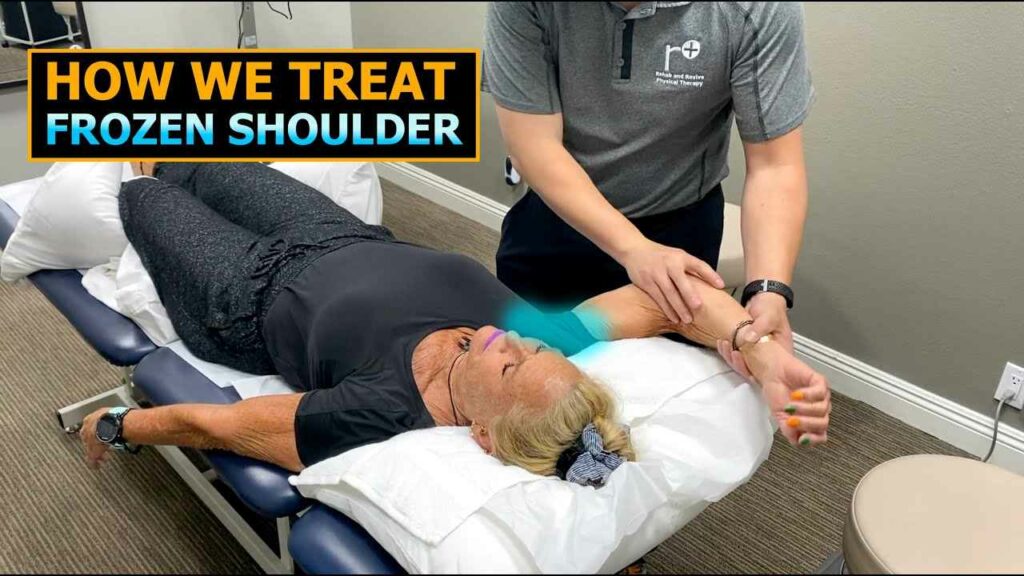Adhesive capsulitis, also known as frozen shoulder, is a condition that can cause a great deal of pain and stiffness in the shoulder. The shoulder joint becomes very inflamed and the range of motion is greatly reduced. In some cases, adhesive capsulitis can lead to disability. If you are suffering from this condition, there are treatments available that can help you regain mobility and reduce your pain. In this blog post, we will discuss what adhesive capsulitis is, its symptoms, and how you can treat it.
Contents
What Is Adhesive Capsulitis?

Adhesive capsulitis is a condition where the shoulder capsule, a ligamentous structure that encircles the shoulder joint, becomes stiff and thickened. This causes decreased range of motion in the shoulder, pain, and weakness. It typically occurs after an injury or surgery to the shoulder but can also develop spontaneously over time.
The shoulder capsule is made up of several ligaments and muscles that work together to keep the shoulder joint stable. When these structures become thickened, they can restrict movement and cause pain and discomfort.
How Can You Treat Adhesive Capsulitis?

There are various treatment options for adhesive capsulitis. They are as follows:
Anti-inflammatory Medications
Anti-inflammatory medications such as ibuprofen can help reduce inflammation and pain associated with adhesive capsulitis.
Corticosteroids
Corticosteroids are a type of medication that helps to reduce inflammation and pain in the shoulder joint. They are usually injected directly into the shoulder joint.
Surgery
In severe cases of adhesive capsulitis, surgery may be required to release the scar tissue that has built up in the shoulder joint. This is typically done through an arthroscopic procedure, which involves making a few small incisions in the skin and inserting a camera and special instruments into the joint to remove scar tissue.
Physical Activity
It is important to stay physically active while recovering from adhesive capsulitis. Low-impact activities such as walking, swimming, and cycling can help to improve shoulder range of motion and strength. Your physical therapist or doctor may recommend specific exercises to help you recover from the condition.
Overall, adhesive capsulitis can be a difficult condition to manage. However, with the help of physical therapy and other forms of treatment such as stretching exercises, manual therapy, anti-inflammatory medications, corticosteroids, and surgery if necessary – recovery is possible. Be sure to talk to your doctor or physical therapist about the best treatment plan for you.
With the proper treatment, adhesive capsulitis can be managed and the shoulder can return to its full range of motion. As always, it is important to speak with a doctor or physical therapist before beginning any type of exercise program in order to avoid further injury. With dedication and consistency, recovery from adhesive capsulitis is possible.
What Type Of Physical Therapy is Used In Adhesive capsulitis?
The type of physical therapy used in adhesive capsulitis are as follows:
Range of motion exercise
This involves stretching and range of motion exercises. These are done to help restore normal shoulder movements, reduce pain and stiffness, and improve shoulder strength.
Joint mobilization
This type of physical therapy helps to improve the overall range of movement at the shoulder joint as well as improve flexibility in the surrounding muscles and tissues.
Posture correction
Proper posture can be helpful in reducing the symptoms of adhesive capsulitis, so working on proper posture is important for managing this condition.
Strengthening exercises
Specific strengthening exercises may also be prescribed to help improve the strength of the shoulder muscles and restore pain-free movement.
Massage therapy
Massage can help reduce tension, stiffness, and pain by increasing blood flow to the affected area. This can also help improve the range of motion and flexibility.
Ice/heat therapy
Ice and heat therapy can be used to reduce pain and inflammation, as well as promote healing.
Physical therapists may also use additional treatments such as ultrasound, electrical stimulation, and taping to help with symptoms of adhesive capsulitis. By following a physical therapist-prescribed treatment plan, you can improve your shoulder mobility, reduce pain and stiffness, and enhance your overall shoulder function.
It is important to understand that successful treatment of requires dedication and patience. Working with a physical therapist can help ensure you are following the right treatment plan for your individual condition. If you think you may have an issue, speak with your doctor to discuss the best treatment options for you. With the right plan and dedication, you can improve your shoulder function and reduce pain.
Prevention Tips
There are various prevention tips:
1. Avoid excessive use of the affected joint: Excessive and repetitive activities can put a strain on the shoulder joint, which can result in stiffness, pain, and adhesive capsulitis. It is recommended to take regular breaks during physical activities and vary your exercise routine to avoid fatigue in one muscle group.
2. Strengthen muscles around the shoulder: Strengthening the muscles surrounding the shoulder can help to stabilize and support it. Regularly performing exercises that focus on strengthening these muscles may help prevent adhesive capsulitis from developing or becoming worse.
3. Wear supportive braces: Wearing a supportive brace during repetitive activity may help reduce strain on the shoulder joint, which can prevent the development of adhesive capsulitis.
Conclusion
It may be concluded that adhesive capsulitis is a painful and disabling condition that affects the shoulder joint. While there is no single cause of this condition, it has been linked to surgical procedures, trauma or injury, diabetes, and other underlying medical conditions. Treatment may involve physical therapy, anti-inflammatory medications, corticosteroid injections, or even surgery. If you think you may have adhesive capsulitis, it is important to consult a medical professional to discuss the best treatment plan for your condition. With proper care and management, your symptoms can be managed and you can regain your full range of motion in the affected shoulder joint.
Physical Therapy help patients recover from pain. If you’re experiencing Back pain, Shoulder pain, Knee pain, Neck pain, Elbow pain, Hip pain, or Arthritis pain, a physical therapist at MantraCare can help: Book a physiotherapy session.


